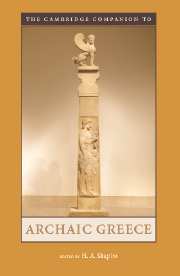2 - Polis, Community, and Ethnic Identity
from Part 1 - History of Archaic Greece
Published online by Cambridge University Press: 28 November 2009
Summary
Traditionally, treatments of the Archaic Greek world have been dominated by discussion of the polis - a term that is often loosely (but not entirely erroneously) translated as “city-state.” Victor Ehrenberg, who in many ways pioneered modern research into the origins of the polis, described it as the very “foundation and support of Greek culture”; more recently, Oswyn Murray has characterized it as “the dominant form of government in the Greek-speaking world for roughly a thousand years, enabling city dwellers to control directly all or much of their own government, and to feel a local loyalty to an extent which no modern society has achieved.” In reality, this emphasis on the polis has tended to obscure the fact that in numerous regions of Greece, especially in the north and west, it was not the exclusive or even dominant form of sociopolitical organization until fairly late in the Classical period. On the other hand, there is no denying that much of the literature that survives from the Archaic period betrays the perspective of poets for whom the polis constituted an important point of reference, and this should at least serve to justify continued interest in how and when this characteristically Greek institution arose. To answer these questions, however, we first need to define what the polis was. Although it would be a mistake to assume that every polis developed in the same way or as a result of the same factors, there are nevertheless certain shared defining characteristics that can be identified.
- Type
- Chapter
- Information
- The Cambridge Companion to Archaic Greece , pp. 40 - 60Publisher: Cambridge University PressPrint publication year: 2007
- 19
- Cited by

